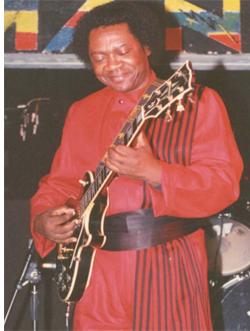|
 Lokassa ya Mbongo (Lokassa Kasia, Denis), Congolese guitarist; born Kinshasa, 1946; died Nashua, New Hampshire, USA , March 14, 2023. Lokassa ya Mbongo (Lokassa Kasia, Denis), Congolese guitarist; born Kinshasa, 1946; died Nashua, New Hampshire, USA , March 14, 2023.
In the world of Congolese music where lead guitarists almost always get the glory, Lokassa is the rare bird who played rhythm guitar to stardom. It didn't hurt that he began his professional career in one of Africa's great bands, Afrisa led by Tabu Ley. Starting in 1968, when the band was still called African Fiesta National, he did his time in obscurity accompanying a succession of prominent lead players that included Attel Mbumba, Mavatiku Visi, and Dino Vangu.
Like Mwamba Dechaud, the formidable rhythm accompanist of African Jazz, Lokassa strung his guitar with two E strings—the second in place of the normal D string—a style called the mi-composé. For ten years he played on all Fiesta National/Afrisa's hits and took the stage in Paris in 1970 for the band's breakthrough performances at the famed Olympia.
In 1978, during one of Afrisa's numerous tours, Lokassa and several band mates dropped out in Abidjan to try something new. Lokassa, guitarist Dizzy Mandjeku, and drummer Ringo Moya joined with singer Sam Mangwana, who was already in Abidjan, to form the African All Stars. This seminal group, together for only a year, recorded a number of excellent songs including Lokassa's "Makengo" and "Zamba y'Africa." When the All Stars broke up in Togo in 1979, Lokassa settled in the capital, Lomé, and began to call himself Lokassa ya Mbongo, essentially Lokassa the money man. He performed with the growing numbers of Congolese musicians in exile including future members of Quatre Etoiles Nyboma Mwan Dido, Syran M'Benza, and Bopol Mansiamina. His 1982 reunion with Mandjeku, Mangwana, and Moya produced a second round of African All Stars recordings including his own Bonne Année.
Lokassa moved to Paris in 1984 where he quickly found his niche as a session player, recording with the likes of Abeti, Kanda Bongo Man, and Pepe Kalle. One such gig for producer Ibrahima Sylla and Congo-Brazzaville singer Ballou Canta led to a new formation. Lokassa, Ballou, guitarist Dally Kimoko, and singers Lukombo Shimita, Yondo "Sister" Kusala, and Neil Zitany joined together in 1989 as the Soukous Stars.
Lokassa created the Soukous Stars' biggest seller only a few months later. Megamix
Vol. 1, two medleys of old hits from West and East Africa set to the up-tempo rumba called soukous, earned instant fame for Lokassa and the band. In the ensuing years Lokassa presided over a changing cast of characters, but his Soukous Stars survived. Another pair of medleys of African hits, Soukous Attack from 1994, began to rival Megamix in popularity.
Over his more than thirty years as a musician, Lokassa has become one of the best-known Congolese rhythm guitarists, rivaled only by Bopol and Dechaud. His nimble fingers have paced a number of Kinshasa rumba classics and a variety of Paris soukous hits. He has also made his mark as a leader and arranger, contributing heavily to the evolution and outpouring of the Congolo-Paris sound.
© 2011 Gary Stewart
SELECT DISCOGRAPHY
With African All Stars: Sam Mangwana Georgette Eckins (Sonodisc CDS7002) seventies recordings reissued 1996.
With Afrisa: Tête Nakozonga (Sonodisc CD36559) seventies recordings reissued 1996; Rochereau Tabu Ley (Sonodisc CD36562) seventies recordings reissued 1996.
With Soukous Stars: Megamix (Syllart SYLCD83100) 1989; Gozando (Syllart 38119-2) 1993; Soukous Attack (African Music Gallery AMG014) 1994; Soukous Force One (Afro Rythmes AR1038) 1998.
SELECT BIBLIOGRAPHY
G. Stewart, "Soukous Stars Bring Relief," The Beat (vol 12, no. 3, 1993); G. Stewart, Rumba on the River (London and New York, 2000).
|

